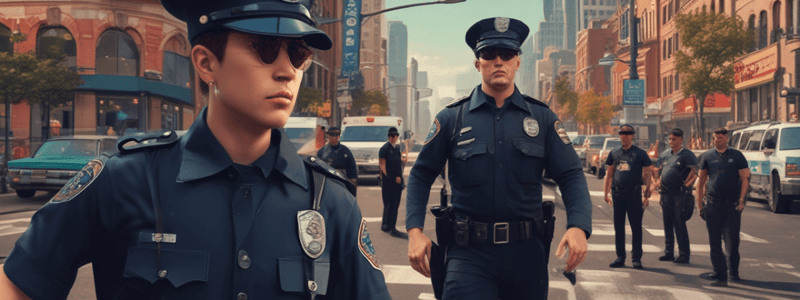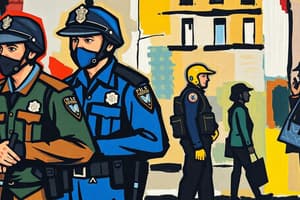Podcast
Questions and Answers
What is emphasized in movies and television shows about the police?
What is emphasized in movies and television shows about the police?
- Their crime-fighting role (correct)
- Their role as peacekeepers
- Their administrative duties
- Their role as social service providers
What do police officers primarily emphasize about their role?
What do police officers primarily emphasize about their role?
- Their crime-fighting role (correct)
- Their role as social service providers
- Their role as peacekeepers
- Their administrative duties
What did Elaine Cumming and her colleagues report about the ordinary work routines of police officers?
What did Elaine Cumming and her colleagues report about the ordinary work routines of police officers?
- All choices are correct (correct)
- Focus on law enforcement activities
- Focus on social service activities
- Focus on peacekeeping activities
Is the police role well defined with little ambiguity according to the text?
Is the police role well defined with little ambiguity according to the text?
What did the 'defense of life' standard allow for police officers?
What did the 'defense of life' standard allow for police officers?
Do police generally have more discretion than other officials in the criminal justice system?
Do police generally have more discretion than other officials in the criminal justice system?
Most police contacts involve which of the following?
Most police contacts involve which of the following?
How is the 'police role' generally described?
How is the 'police role' generally described?
What did Robert Lilly's research conclude about the majority of police calls?
What did Robert Lilly's research conclude about the majority of police calls?
According to Egon Bittner, how has police work been viewed since its earliest origins?
According to Egon Bittner, how has police work been viewed since its earliest origins?
According to Sheehan and Cordner, what are the two primary goals and objectives of police departments?
According to Sheehan and Cordner, what are the two primary goals and objectives of police departments?
Based on Broderick's police operational styles, which type of officer focuses on safety and security?
Based on Broderick's police operational styles, which type of officer focuses on safety and security?
According to Broderick, which police operational style emphasizes community involvement?
According to Broderick, which police operational style emphasizes community involvement?
Which officer's role aligns with maintaining order by arresting criminals?
Which officer's role aligns with maintaining order by arresting criminals?
Officer Brown carefully avoids violating individuals' constitutional rights. What police operational style does he represent according to Broderick?
Officer Brown carefully avoids violating individuals' constitutional rights. What police operational style does he represent according to Broderick?
Officer Green prioritizes police loyalty over achieving department goals. Which police operational style does Broderick associate with this approach?
Officer Green prioritizes police loyalty over achieving department goals. Which police operational style does Broderick associate with this approach?
In Broderick's classification, Officer White's focus on helping individuals in trouble rather than societal safety aligns with being a(n) ____________.
In Broderick's classification, Officer White's focus on helping individuals in trouble rather than societal safety aligns with being a(n) ____________.
What was the U.S. Supreme Court case that declared the fleeing felon rule unconstitutional in 1985?
What was the U.S. Supreme Court case that declared the fleeing felon rule unconstitutional in 1985?
Why has the legality and morality of the 'fleeing felon' rule been challenged according to the text?
Why has the legality and morality of the 'fleeing felon' rule been challenged according to the text?
In relation to arrests for criminal infractions, excluding traffic violations, how many million arrests do the police make approximately each year?
In relation to arrests for criminal infractions, excluding traffic violations, how many million arrests do the police make approximately each year?
Which statement is incorrect based on the text?
Which statement is incorrect based on the text?
What role does gender play in the use of force incidents by police officers according to the text?
What role does gender play in the use of force incidents by police officers according to the text?
Which of the following statements accurately describes the Supreme Court's ruling in Tennessee v. Garner?
Which of the following statements accurately describes the Supreme Court's ruling in Tennessee v. Garner?
Which of the following is NOT one of the primary methods used by police to maintain order and protect individuals and property?
Which of the following is NOT one of the primary methods used by police to maintain order and protect individuals and property?
What is the term used to describe the police's attempt to create a sense that they are always present?
What is the term used to describe the police's attempt to create a sense that they are always present?
According to Carl B. Klockars in 'Idea of Police', what is the basic function of the police broadly defined as?
According to Carl B. Klockars in 'Idea of Police', what is the basic function of the police broadly defined as?
Which of the following is identified in the text as a way to control discretion, particularly improper application of discretion?
Which of the following is identified in the text as a way to control discretion, particularly improper application of discretion?
Which of the following is identified as a CON of police discretion in the text?
Which of the following is identified as a CON of police discretion in the text?
Which ethical consideration is most important in the use of police discretion?
Which ethical consideration is most important in the use of police discretion?
Which of the following is NOT mentioned in the text as a factor influencing police discretion?
Which of the following is NOT mentioned in the text as a factor influencing police discretion?
Flashcards are hidden until you start studying
Study Notes
Factors Influencing Police Discretion
- Officer experience affects discretion, with more experienced officers making better judgments
- Department policies guide officers' decisions, but may restrict their discretion
- Cultural differences between officers and community members impact decision-making
- The balance between flexibility and transparency in police discretion
Pros and Cons of Police Discretion
- Flexibility in responding to unique situations and promoting accountability
- Racial biases and unequal application of justice due to personal biases
- Lack of transparency undermines public trust
Ethics of Police Discretion
- Ethical considerations include fairness, impartiality, and honesty
- Misuse of discretion erodes public trust
Legal Limitations on Police Discretion
- Procedural due process, substantive due process, and equal protection under the Fourteenth Amendment
- Ensuring consistent application of law and upholding constitutional rights
Impact of Police Discretion on Communities
- Positive relationships and trust between officers and communities
- Effective use of discretion promotes community safety and well-being
Police Role and Discretion
- The police role is multifaceted and ambiguous, encompassing law enforcement, peacekeeping, and social services
- Police have significant discretion in making decisions, with consequences for communities
- Factors influencing discretion include officer experience, department policies, and cultural backgrounds
Studying That Suits You
Use AI to generate personalized quizzes and flashcards to suit your learning preferences.




